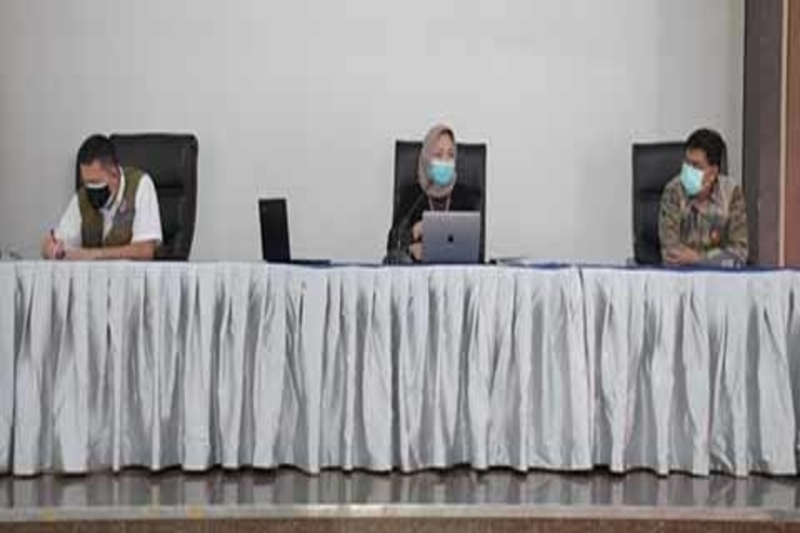
The Indonesian Ministry of Health’s COVID-19 Taskforce Team returned to visit South Kalimantan Province to encourage local health officials to embrace digital solutions for health services.
On this visit, the team led by the Special Staff of the Minister of Health for the Improvement of Health Human Resources, Dr Mariya Mubarika, held an interaction with healthcare providers in the South Kalimantan Province, namely the South Kalimantan Provincial Health Office, District / City Health Services in South Kalimantan, the Provincial Covid-19 Task Force, BPBD and other related parties.
Held at the South Kalimantan Provincial Bapelkes hall on Saturday, the meeting was designed to emphasise the importance of implementing electronic services in cutting off the transmission of the virus in the community. Mariya urged health workers to take advantage of digital services in tackling COVID-19. The Ministry of Health encouraged the health office to use Telesehat services in providing education about COVID-19 to the public.
Mariya stressed that digital technology not only provides efficiency and facilitates wider access, the use of Telesehat would also significantly reduce morbidity and mortality rates.
The use of digital services would not only facilitate services but will also accelerate the process of providing action to people who need services quickly. Using electronic health services, health workers can perform triage more easily and quickly. In addition, people also do not need to risk coming to health service facilities for consultations.
According to Mariya, COVID-19 could be stopped by changing behaviour at all levels of society. Local governments need to develop and deploy local regulations to emphasise the implementation of health protocols as a way to increase compliance in the community. This is best done with technology and digital solutions.
The Head of the South Kalimantan Provincial Health Office, Dr Muslim said to slow down and stop the transmission rate of COVID-19, his organisation had done several things. This included carrying out massive social awareness of the application of health protocols through the IEC Contact Search Team, empowering the community by forming the Tangguh Banua Village, conducting equity operation activities and increasing testing facilities with the improvement of the RT-PCR & TCM Laboratory.
“Currently, South Kalimantan has been able to test for COVID-19, with the results being known in less than 24 hours. This will certainly speed up confirmed patient care and close contact tracing,” said Muslim.
He confirmed that their staff routinely conduct monitoring and evaluation with the Regency / City Health Office and related parties in order to gain a better understanding regarding the handling of COVID-19 in South Kalimantan.
These initiatives are is in line with the government’s message to limit activities outside the home. As part of the government’s Industry Revolution 4.0 agenda, the Ministry of Health principally supports the growth of telemedicine and encourages healthcare service providers to begin adopting telemedicine model in giving healthcare services to patients.
Telemedicine is covered in Minister of Health Regulation concerning the organisation of health service facilities in remote areas and very remote Areas to support health services such places, to increase the accuracy of and accelerate the process of providing medical diagnoses and consultations and other health service facilities in areas which lack health workers with specific qualifications.
To further implementation, particularly telemedicine services, the Ministry issued another regulation concerning the organisation of telemedicine services between Health Service Facilities that would to specifically regulate telemedicine.
In April this year, the Indonesian Medical Council (Konsil Kedokteran Indonesia, KKI) issued a regulation on Clinical Authorities and Medical Treatment Through Telemedicine During the COVID-19 Pandemic (“KKI Regulation 74”).
















